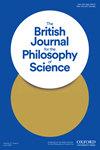确认与归纳
IF 3.2
1区 哲学
Q1 HISTORY & PHILOSOPHY OF SCIENCE
British Journal for the Philosophy of Science
Pub Date : 2018-07-19
DOI:10.1093/oso/9780190690649.003.0002
引用次数: 0
摘要
如何根据经验数据评估科学假设和理论?科学哲学家试图找出这种活动是否有普遍的原理。本章梳理了哲学确认理论的主要类型。本文首先提出了两种基于(演绎)逻辑的定性确认标准:实例主义和假设演绎主义。本章的主要部分是致力于贝叶斯确认理论(BCT),它依赖于一个概率框架,能够提供定性和定量的确认标准。我们详细讨论了BCT的优势和局限性。在最后一节,我们将讨论BCT(以及一般的贝叶斯主义)与归纳法问题之间的关系。本文章由计算机程序翻译,如有差异,请以英文原文为准。
Confirmation and Induction
How are scientific hypotheses and theories assessed against empirical data? Philosophers of science have tried to find out whether there are general principles underlying this activity. This chapter goes through the major types of philosophical theories of confirmation. It starts with two proposals that elaborate criteria of qualitative confirmation on the basis of (deductive) logic: instantialism and hypothetico-deductivism. The main part of the chapter is devoted to Bayesian confirmation theory (BCT), which relies on a probabilistic framework and is able to provide both qualitative and quantitative criteria of confirmation. We discuss in details the strengths and limits of BCT. In the closing section, we address the issue of how BCT (and Bayesianism in general) relate to the problem of induction.
求助全文
通过发布文献求助,成功后即可免费获取论文全文。
去求助
来源期刊

British Journal for the Philosophy of Science
管理科学-科学史与科学哲学
CiteScore
6.00
自引率
0.00%
发文量
50
审稿时长
>12 weeks
期刊介绍:
The British Journal for the Philosophy of Science encourages the application of philosophical techniques to issues raised by the natural and human sciences. These include general questions of scientific knowledge and objectivity, as well as more particular problems arising within specific disciplines.
Topics currently being discussed in the journal include: causation, the logic of natural selection, the interpretation of quantum mechanics, the direction of time, probability, confirmation, foundations of mathematics, supertasks and the theory of emotion.
 求助内容:
求助内容: 应助结果提醒方式:
应助结果提醒方式:


